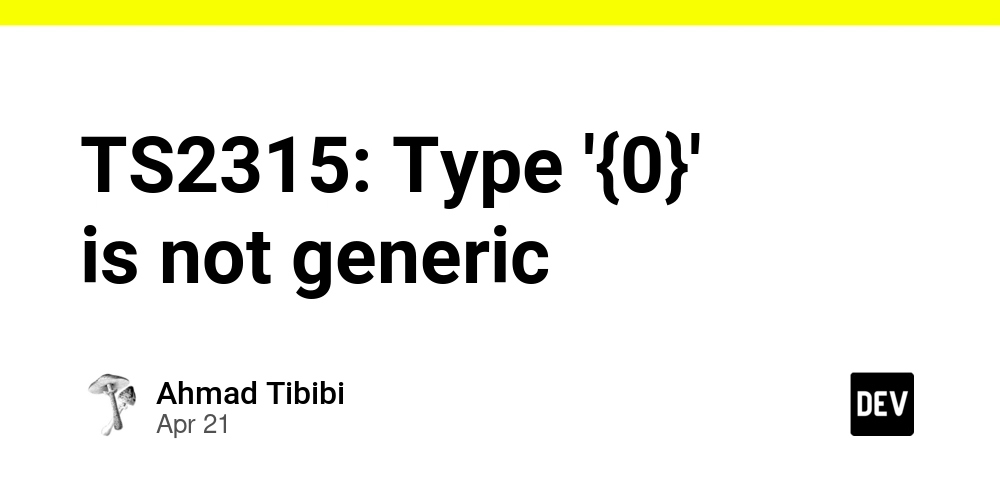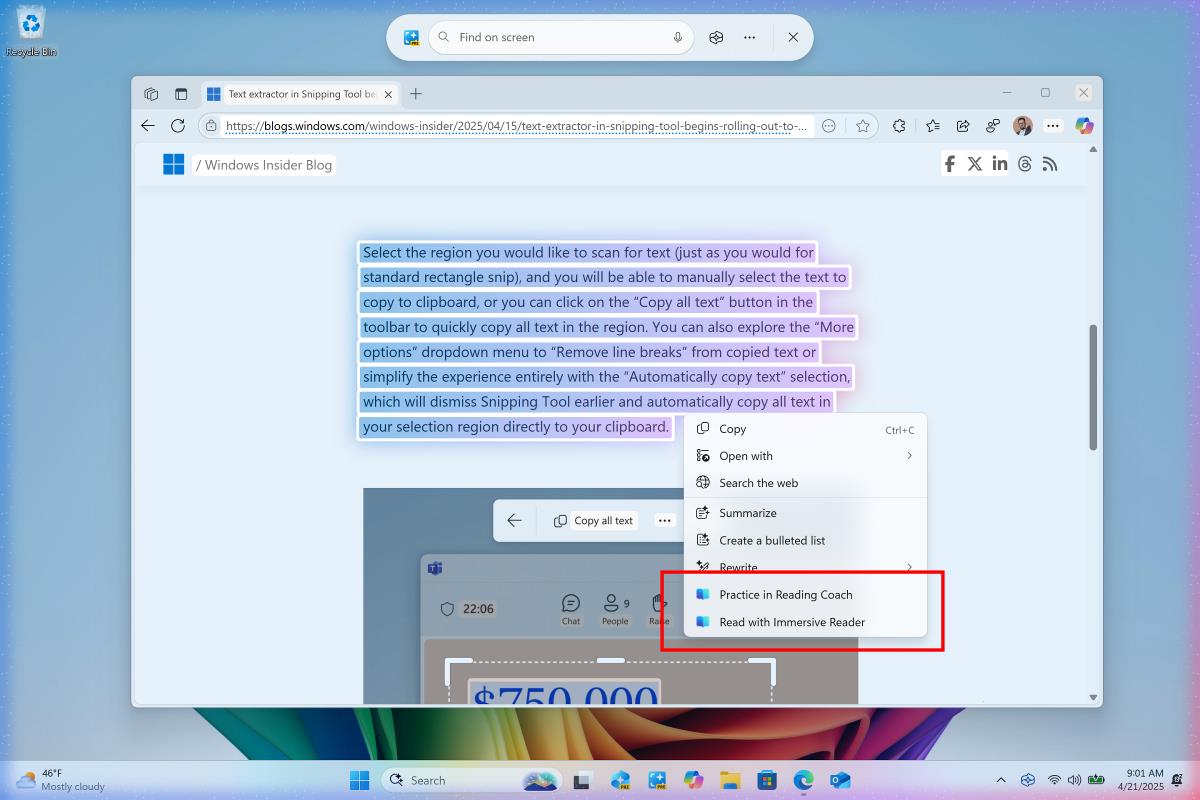TS2315: Type '{0}' is not generic
TS2315: Type '{0}' is not generic TypeScript is a powerful programming language built on top of JavaScript. It introduces static typing (adding types to variables and functions at compile time) among other features that help developers catch errors early during development rather than at runtime. TypeScript is often described as a "superset" of JavaScript, meaning it builds on JavaScript by adding features to it, without altering the core language. If you're already familiar with JavaScript, you can think of TypeScript as an enhanced version with robust tooling. To learn TypeScript or sharpen your coding skills using AI tools, consider following my blog or checking out GPTeach to get started with AI-assisted programming. Before we dive into the specific error message, let’s briefly talk about types, one of the foundational concepts of TypeScript. A type in TypeScript describes a specific structure or shape of data. For example, you might define whether a variable holds a string, number, boolean, or even a custom shape like an object. You can think of types as rules that dictate what values are permitted for a variable or function. Here’s an example illustrating types in TypeScript: let age: number = 30; // age must be a number let name: string = "Alice"; // name must be a string let isAdmin: boolean = true; // isAdmin must be a boolean Now, let’s focus on our main topic: the error TS2315: Type '{0}' is not generic. TS2315: Type '{0}' is not generic The error TS2315: Type '{0}' is not generic occurs when you attempt to use a type as if it were generic but the type is not actually designed to be generic. In TypeScript, a generic type is a type that can take type parameters, allowing developers to create reusable components while maintaining type safety. For example, the Array type is generic because it can hold any type T. What does "not generic" mean? If a type is "not generic," it means that it cannot accept type parameters. For example, the built-in Date type in TypeScript is not generic—you cannot write something like Date. Similarly, if a type is defined without type parameters, it cannot be treated as generic. Example of the error Here’s an example that will trigger TS2315: Type '{0}' is not generic: type MyType = string; // MyType is a simple alias for string // Trying to use MyType as a generic type (this will cause the error) function example(value: T) { console.log(value); } When you compile this code, you’ll see an error similar to this: TS2315: Type 'MyType' is not generic. The problem here is that MyType is just an alias for string, and it is not defined as a generic type. You cannot treat MyType as if it accepts a type parameter because it was not designed that way. How to Fix TS2315: Type '{0}' is not generic To fix this error, you need to ensure that you are only using generic parameters , , etc., with types that are explicitly defined as generic. Let’s review a corrected example: // Defining a proper generic type type MyGenericType = T[]; // This is a generic type that takes one type parameter T // Using the generic type correctly function example(value: T) { console.log(value); } In this corrected example, we define MyGenericType as a generic type that accepts a single type parameter T. Now, you can safely provide a type argument like number or string when using MyGenericType. Important to Know! What are generics? Generics in TypeScript allow you to write reusable and type-safe code. They act as placeholders for types. For instance, a generic array type Array can hold an array of any type (T), whether strings, numbers, or custom objects. You cannot use a generic structure on a non-generic type. This error arises when you try to treat a non-generic type (like string or Date) as generic with type parameters. Always check if the type was designed to accept type arguments. Generic definitions must include parameters. If you're creating a custom generic type, ensure you explicitly define it with type parameters like . FAQs What causes the error TS2315: Type '{0}' is not generic? This error occurs when you try to use a type as if it accepts type parameters (generic), but the type is not designed to be generic. How do I know if a TypeScript type is generic? Check the type definition. If the type includes angle brackets , it is generic. For example, Array and Promise are generic types, while string or Date are not. Can interfaces or classes be generic? Yes, both interfaces and classes in TypeScript can be defined as generic. interface GenericInterface { value: T; } class GenericClass { private data: T; constructor(data: T) { this.data = data; } getData(): T { return this.data; } } Important to Know! Understand Type Definitions: When working with custom types, always

TS2315: Type '{0}' is not generic
TypeScript is a powerful programming language built on top of JavaScript. It introduces static typing (adding types to variables and functions at compile time) among other features that help developers catch errors early during development rather than at runtime. TypeScript is often described as a "superset" of JavaScript, meaning it builds on JavaScript by adding features to it, without altering the core language. If you're already familiar with JavaScript, you can think of TypeScript as an enhanced version with robust tooling. To learn TypeScript or sharpen your coding skills using AI tools, consider following my blog or checking out GPTeach to get started with AI-assisted programming.
Before we dive into the specific error message, let’s briefly talk about types, one of the foundational concepts of TypeScript.
A type in TypeScript describes a specific structure or shape of data. For example, you might define whether a variable holds a string, number, boolean, or even a custom shape like an object. You can think of types as rules that dictate what values are permitted for a variable or function.
Here’s an example illustrating types in TypeScript:
let age: number = 30; // age must be a number
let name: string = "Alice"; // name must be a string
let isAdmin: boolean = true; // isAdmin must be a boolean
Now, let’s focus on our main topic: the error TS2315: Type '{0}' is not generic.
TS2315: Type '{0}' is not generic
The error TS2315: Type '{0}' is not generic occurs when you attempt to use a type as if it were generic but the type is not actually designed to be generic. In TypeScript, a generic type is a type that can take type parameters, allowing developers to create reusable components while maintaining type safety. For example, the Array type is generic because it can hold any type T.
What does "not generic" mean?
If a type is "not generic," it means that it cannot accept type parameters. For example, the built-in Date type in TypeScript is not generic—you cannot write something like Date. Similarly, if a type is defined without type parameters, it cannot be treated as generic.
Example of the error
Here’s an example that will trigger TS2315: Type '{0}' is not generic:
type MyType = string; // MyType is a simple alias for string
// Trying to use MyType as a generic type (this will cause the error)
function example<T extends MyType<string>>(value: T) {
console.log(value);
}
When you compile this code, you’ll see an error similar to this:
TS2315: Type 'MyType' is not generic.
The problem here is that MyType is just an alias for string, and it is not defined as a generic type. You cannot treat MyType as if it accepts a type parameter
How to Fix TS2315: Type '{0}' is not generic
To fix this error, you need to ensure that you are only using generic parameters , etc., with types that are explicitly defined as generic. Let’s review a corrected example:
// Defining a proper generic type
type MyGenericType<T> = T[]; // This is a generic type that takes one type parameter T
// Using the generic type correctly
function example<T extends MyGenericType<number>>(value: T) {
console.log(value);
}
In this corrected example, we define MyGenericType as a generic type that accepts a single type parameter T. Now, you can safely provide a type argument like number or string when using MyGenericType.
Important to Know!
What are generics?
Generics in TypeScript allow you to write reusable and type-safe code. They act as placeholders for types. For instance, a generic array typeArraycan hold an array of any type (T), whether strings, numbers, or custom objects.You cannot use a generic structure on a non-generic type.
This error arises when you try to treat a non-generic type (likestringorDate) as generic with type parameters. Always check if the type was designed to accept type arguments.Generic definitions must include parameters.
If you're creating a custom generic type, ensure you explicitly define it with type parameters like
FAQs
What causes the error TS2315: Type '{0}' is not generic?
This error occurs when you try to use a type as if it accepts type parameters (generic), but the type is not designed to be generic.
How do I know if a TypeScript type is generic?
Check the type definition. If the type includes angle brackets Array and Promise are generic types, while string or Date are not.
Can interfaces or classes be generic?
Yes, both interfaces and classes in TypeScript can be defined as generic.
interface GenericInterface<T> {
value: T;
}
class GenericClass<T> {
private data: T;
constructor(data: T) {
this.data = data;
}
getData(): T {
return this.data;
}
}
Important to Know!
Understand Type Definitions: When working with custom types, always clarify whether they are intended to be generic or not by reviewing their definitions.
Use Generics When Needed: Generics are a critical tool in ensuring type safety while retaining flexibility. Avoid trying to force generics on non-generic types, as this will cause errors like TS2315: Type '{0}' is not generic.
Read the Error Message Closely: TypeScript error messages are usually detailed and provide hints about what went wrong. For TS2315: Type '{0}' is not generic, the key takeaway is that the type in question does not accept type parameters.
In conclusion, the TypeScript error TS2315: Type '{0}' is not generic reminds us to ensure we correctly distinguish between generic and non-generic types. Whether you're creating custom types, working with interfaces, or leveraging built-in generic types like Array and Promise, understanding the difference is crucial. If you want to deepen your understanding of TypeScript or explore AI-powered tools for learning, don’t forget to check out GPTeach for support.








































































































































































![[The AI Show Episode 144]: ChatGPT’s New Memory, Shopify CEO’s Leaked “AI First” Memo, Google Cloud Next Releases, o3 and o4-mini Coming Soon & Llama 4’s Rocky Launch](https://www.marketingaiinstitute.com/hubfs/ep%20144%20cover.png)



































































































































![From fast food worker to cybersecurity engineer with Tae'lur Alexis [Podcast #169]](https://cdn.hashnode.com/res/hashnode/image/upload/v1745242807605/8a6cf71c-144f-4c91-9532-62d7c92c0f65.png?#)
























![BPMN-procesmodellering [closed]](https://i.sstatic.net/l7l8q49F.png)


























































































































.webp?#)













































































































![Next Generation iPhone 17e Nears Trial Production [Rumor]](https://www.iclarified.com/images/news/97083/97083/97083-640.jpg)
![Apple Releases iOS 18.5 Beta 3 and iPadOS 18.5 Beta 3 [Download]](https://www.iclarified.com/images/news/97076/97076/97076-640.jpg)
![Apple Seeds visionOS 2.5 Beta 3 to Developers [Download]](https://www.iclarified.com/images/news/97077/97077/97077-640.jpg)
![Apple Seeds tvOS 18.5 Beta 3 to Developers [Download]](https://www.iclarified.com/images/news/97078/97078/97078-640.jpg)





























































































































